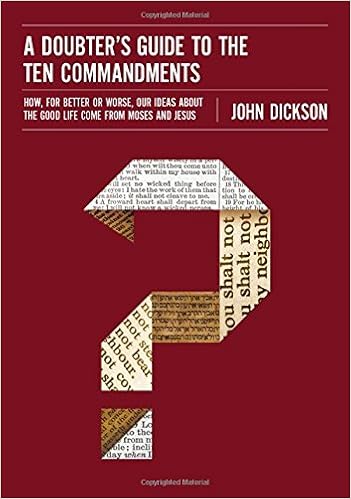
A
Doubter’s Guide to the Ten Commandments by John Dickson
Minister, teacher, and public commentator for the
veracity of the Christian faith, including its Scripture, John Dickson has
given us a wonderful book on the Ten Commandments called A Doubter’s Guide to the Ten Commandments. From their inception, the Ten Commandments
have been an ever present reality in art, film, literature, and culture. We often believe that these commandments have
changed our life, but John explores this words as also providing a path for the
good life.
One of the central affirmations of John’s look into the
Ten Commandments comes in the beginning of his book when he writes, “So what
are the key motivations for ethics in the Bible? One of the central inspirations for pursuing
the Good is pretty much the inverse of fear
of punishment or hope of reward. It is the knowledge that you are already
loved and redeemed by the Almighty (28).”
Written in the prologue of the commandment passage in Exodus 20 is the
reminder that God brought the people out of the land in Egypt, out of the house
of slavery. This reminder points them to
a gracious God who had already done something mighty for them and was giving
them now a way to live before Him.
Dickson points out that Moses’ words were pretty simple, the truth was
that God was already there before Israel had a chance to obey (30).
Another of the more focused and encouraging parts of the
book was John’s look at the fifth commandment.
He writes, “To “honour” parents once you have left home means to support them (111).” This support will come in material needs,
emotional needs, but also in a support that comes from being present in their
lives. John goes onto make this
important connection, “…members of the church who don’t care for their own
parents (or grandparents) are worse than those who have no faith (113).” Drawing on 1 Timothy 5:3-4, Paul’s words could not be
more pronounced. There have been
significant systems of support and care for the poor both in Austrailia and in
the United States, but much of this care has been done outside the church. The church as a body of believers has the
responsibility to care for it members and families with dignity and compassion.
This is both of book for those interested in what the
Ten Commandments have to say and for those who doubt their importance. John is both writer and apologist in these
pages and I know many will find a healthy dose of encouragement here. Further, John connects the figures of Moses
and Jesus in a way that helps see a connection between the story of the Bible
and our lives.
Thanks to Zondervan and BookLook Bloggers for the copy
of this book in exchange for an honest review.
Comments
Post a Comment